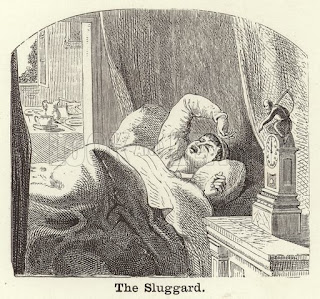The Virtues of Idleness
Over the years, idleness has gotten a bad rap. Even the dictionary definition is a bit condescending: "the quality or state of being idle (as through lack of worth, occupation, employment, industry)." Indeed, idleness has been described variously as
- the root of all evil;
- the enemy of the soul;
- characteristic of a bad, pathetic, and worthless individual;
- the refuge of weak minds;
- the curse of man; and
- golf.
The act of being idle garners even harsher criticism. If you, deities forbid, are idle, you lack worth or "basis" and "have no particular reason to exist." One notable synonym for people who should not exist is "sluggard," or "an habitually lazy idle and inactive person." Not surprisingly, there are 36 bible verses about sluggards (the person who counted these verses is definitely not one of them). Some of these speak loud and clear: "Go to the ant, O sluggard, observe her ways and be wise" (Proverbs). Some seem hyperbolic: "The sluggard buries his hand in the dish, but will not even bring it back to his mouth" (also Proverbs).
Most of the cartoon depictions of sluggartitioners (individuals who practice badness, patheticness, worthlessness, and/or golf) are of individuals (all men it seems) lazing about in bed (see below).
So, as I asked recently about chaos, is there a flip side to idleness? Perhaps not in the behavior itself but maybe inveterate idlers are more than the sum of their signature characteristic. Let's examine, for example, two iconic examples: J. Wellington Wimpy and Bartleby the Scrivener.
Wimpy (shown above), who is known for saying "I'll gladly pay you Tuesday for a hamburger today" whenever he appeared in a Popeye cartoon, has been described as a lazy coward, a miser, and a glutton. On the other hand, he is a soft-spoken romantic and intelligent and educated. While Wimpy is famous for mooching off others, he is the epitome of politeness when he does, a quality often in short supply these days. He has also taught us that, if a legacy is what you seek, a pithy catchphrase will do the trick. His "pay you Tuesday" line is known worldwide and can be, and is, used to gently and tactfully point out someone's financial irresponsibility. I've tried coming up with a phrase with similar viralentiality (the possibility of being viewed, spoken, and passed on by millions), but so far all I have is "uhhhhhh..."
A second, less-polite but perhaps more virtuous example of a sluggard is Bartleby*, the title character of Herman Melville's 1853 short story "Bartleby, the Scrivener: A Story of Wall Street." A scrivener is someone who copies legal documents by hand, and Bartleby works for a lawyer. At first, he does great work and lots of it. But then, gradually, he does less and less and finally does none at all, responding to requests with his own signature phrase, "I prefer not," and choosing instead to stare out the window or at a brick wall. As you may have guessed, things do not end well for the B man.
While Bartleby's single-minded idleness does demonstrate a character who shows perseverance along with quiet passivity and calm, two other qualities suffering from scarcity now, its virtue lies in the behavior it brings out in the narrator: empathy and compassion for an individual who, for whatever, reason cannot fit into "normal" society. When Bartleby ends up in prison near the end, the lawyer tries to ensure, to no avail it turns out, that the scrivener has enough to eat.
You may be wondering why I am trying, desperately perhaps, to find ways to defend idleness. It could be because I often ambitiously set my watch alarm for 6 a.m., thinking I will pop up and write a blog or revise a novel or do actual work-work. When my wrist buzzes me awake before sunrise, I more often than not silence the annoying device, roll over, and go back to sleep, mumbling "I prefer not." Idleness, it seems, is in my blood.
I have a sinking feeling that my supporting points here are weak and unpersuasive, much like the ones in a paper I wrote for an undergraduate English class arguing that Hamlet made stupid choices and would have been better off (and alive) by teaming up with King Fortinbras of Norway to overthrow Claudius and Gertrude. Handing back my paper with a big red C at the top, my professor said, somewhat derisively, "Nice try." Which leaves me with nothing left to say except I'll gladly write a better blog on Tuesday for a "nice try" today.
*Bartleby was played by Hans Conried, shown above, in a 1948 radio adaptation of the short story.




Comments
Post a Comment